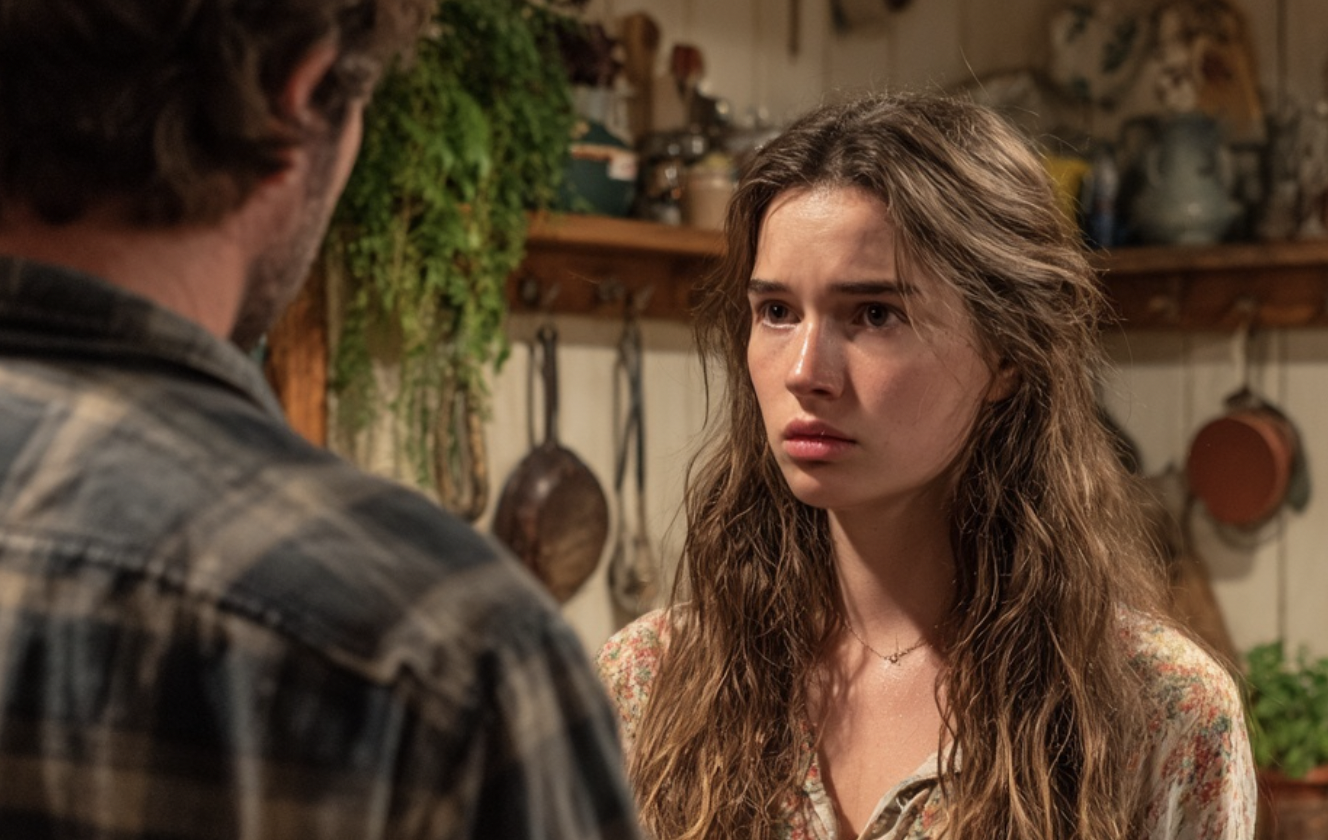— “Ver, I’ve got news! Fantastic news!” Anton burst into the kitchen, beaming as if he’d just won the lottery. Like he owned the place, he lifted the lid and peered into the pot where the soon-to-be stew was gently bubbling, then loudly inhaled the aroma. “Whoa, smells amazing! Listen, you won’t believe what I just found out!”
Vera, without stopping her chopping, only turned her head slightly. She was used to these sudden bursts of enthusiasm from her husband, which usually meant either a new video game purchase or a spontaneous decision to spend the weekend at his mother’s.
“Did something happen?” she asked calmly, sweeping another pile of carrots from the cutting board into the bowl.
“Oh yes, big time! Remember how our Sveta was applying to university? Well, she got in! On a tuition-free spot, can you imagine! Right here, in our city!” He broke into a wide grin, expecting his wife to share his excitement.
“Good for Sveta, I’m happy for her,” Vera said sincerely. She had always felt fine about her husband’s younger sister, a quiet, modest girl. “Will she get a dorm room?”
Anton waved his hand as if batting away something silly.
“Why would she need a dorm, come on. You never know who lives there, and the conditions are awful. No, it’s already decided. She’ll live with us! All five years while she studies. Mom said that’s the proper and most worry-free way for everyone. She’s already packing her things and will bring her next week. Great, right?”
The knife in Vera’s hand froze over the half-cut onion. For a few seconds the only sound in the kitchen was the peaceful sizzle of oil in the pan. She slowly set the knife on the board, wiped her hands on a towel, and turned to her husband. Her face was blank, but her gaze had turned hard and sharp.
Just a month ago, her own brother, Kirill, had planned to come to their city on business. Vera suggested he stay with them to save on a hotel—nothing extraordinary, it seemed. But Anton had thrown a real fit. He’d gone on at length, awkwardly explaining how it would be inconvenient, how they were used to living just the two of them, and how his mother believed that frequent guests and relatives living in the home “destroy a young family.” To avoid a fight, Vera had given in, and her brother booked a room in a cheap hotel on the outskirts.
“Wait,” she said in an icy tone, looking him straight in the eyes. “I don’t think I understand. What about your mother?”
“What about Mom?” Anton didn’t get it; his joyful smile began to slip as he sensed the change in his wife’s mood. “It was Mom’s idea.”
“A month ago your mother believed that relatives have no place in our home. That they destroy the family. My brother couldn’t stay with us for a week because your mother was against it. And your sister will live here for five years because your mother has decided so. Did I get that right?”
Anton faltered. He clearly hadn’t expected this turn and wasn’t ready to defend himself.
“Ver, well… that’s completely different,” he began, looking away. “Kirill is a guest. But Sveta… Sveta is family. She’s practically my twin. And Mom said we have to help a sister, it’s our duty.”
Vera’s patience, hanging by a thread, snapped with a loud crack. She took a step forward, her quiet, restrained voice gathering force, turning into a steel-edged shout.
“And since when does your mother decide who gets to live in our home and who doesn’t?! My brother couldn’t come for a week because she said so, but your sister will live here for five years?”
Stunned, Anton recoiled as if struck. He stared at his wife wide-eyed, completely unable to comprehend where this icy fury had come from. In his world, everything was simple and logical: Mom said it—so it was right. He honestly saw no difference, no contradiction.
“Ver, what’s with you? Calm down,” he muttered, taking a step back toward the kitchen doorway like a refuge. “What does my mom have to do with it? We’re talking about Sveta—my sister. We’re family; we have to help each other. She isn’t some stranger.”
Vera let out a short, humorless laugh. She turned away and picked up the knife again. But now her movements were different—sharp, precise, almost aggressive. The blade bit into the onion, slicing it into tiny, nearly transparent pieces.
“Family? And my brother isn’t family? Or the wrong kind of family?” She didn’t raise her voice, but every phrase hit dead center. “Back then you practically parroted your mother’s arguments. That no one should disturb us, that a man’s home is his castle. What changed in a month, Anton? Did your mother rewrite our family charter?”
“She didn’t rewrite anything! These are different situations!” He was getting irritated, unable to find a logical explanation and feeling cornered. “Kirill is a grown man—he can take care of himself. Sveta is still practically a girl. Mom worries. She wants Sveta under supervision. Under our supervision.”
“Under yours,” Vera corrected, sweeping the minced onion into the pan. The oil hissed furiously, as if sharing her indignation. “You forget, Anton, that decisions in this house are made by the two of us. Or have you already forgotten how your mother decided which couch we would buy, because the one I picked was ‘too easy to stain’? Or how she canceled our mountain trip because ‘it’s dangerous that time of year’ and said we’d be better off going to her dacha to weed the vegetable beds?”
Each memory was a fresh blow. Anton visibly wilted. He remembered it all—remembered having to coax Vera, passing along his mother’s words, sincerely believing they contained wisdom and care.
“She was just advising. She’s older, more experienced…” His voice sounded utterly unsure.
“No, Anton. She wasn’t advising. She was deciding, and you were executing,” Vera said, leaning her hip against the counter. Her gaze was utterly calm—and therefore even more frightening. “And I’m tired of living in a family where every important question gets decided over a phone call to your mother. I’m tired of your mother’s opinion mattering more than mine. More than ours.”
Realizing he was losing on every point, Anton reached for his last resort. He straightened up, and injured, accusatory notes crept into his voice.
“I get it. You just don’t respect my mother. You’ve never liked her, and now you found a reason to say it all. She does everything for us, and you—”
“I treat your mother exactly the way she treats our home: as a place where she can impose her own rules,” Vera cut him off, not letting him spin the narrative of supposed disrespect. “So here’s the reality. Time you remembered whose house this is, and who sets the rules here. Listen carefully: Sveta is not going to live here. This is not up for discussion.”
Anton’s face twisted. The ultimatum, delivered so calmly and firmly, didn’t compute. He was used to Vera giving in after a brief quarrel, accepting his arguments buttressed by his mother’s authority. But now he was facing not his accommodating wife, but a stranger—cold, with steel in her eyes.
“You… you can’t decide this by yourself!” he exhaled, feeling the ground give way beneath him. “This is my house too! And Sveta is my sister!”
“Your sister can rent an apartment. Or a room. Or move into the dorm, like thousands of other students do,” Vera calmly turned off the burner and set the pan aside. Every movement was deliberately unruffled, which infuriated Anton even more. “We can even help her with money at first. But she is not going to live here.”
Seeing that all his arguments about family, duty, and help had smashed against an impenetrable wall, Anton reached for his ultimate, fail-safe weapon. He pulled his phone from his jeans pocket as if drawing a family sword meant to end any battle.
“Oh, that’s how it is? Fine. If you won’t listen to reason,” he said defiantly, quickly finding the cherished number. “I’m calling Mom. She’ll explain everything to you. She’ll explain how wrong you are and how rude you’re being.”
He expected anything: shouting, an attempt to snatch the phone, tears. But Vera only raised an eyebrow slightly and crossed her arms, leaning against the wall.
“Go ahead. Call. I’ll be delighted to listen,” she said, with not a trace of fear—only clear, unclouded curiosity.
Her reaction threw Anton off, but it was too late to back down. He hit “call” and put the phone to his ear.
“Hi, Mommy… Yeah, everything’s fine… almost,” he said, shooting Vera a look full of righteous anger. “I told Vera about Sveta… Yeah, I thought she’d be pleased. But she… Mom, she started a scene. Says she won’t let her move in. At all. Can you imagine? Says you have no right to decide who lives in our house… Yes, she said it just like that. I’m explaining, and she won’t listen…”
He listened for several seconds to the rapid, indignant words on the other end, nodding occasionally. Confidence returned to his face. He was no longer just a husband arguing with his wife, but a goodwill envoy backed by a mighty power—his mother.
“Yes… Yes, I think so too… Okay, Mom.” He lowered the phone and, with a victor’s air, held it out to his wife. “Here, Mom wants to talk to you.”
Without the slightest hesitation, Vera took the phone from his hand. She brought it to her ear without changing her posture.
“Good afternoon, Galina Ivanovna,” she said, her voice even and polite, but with the chill of the Arctic in that politeness.
She listened in silence to the tirade spilling from the speaker. Anton watched her, waiting for contrition to show on her face. But it remained impassive.
“I hear you’ve already packed Sveta’s things,” Vera said calmly, interrupting the monologue. “You can unpack them.” She paused briefly to let that sink in. “No, Galina Ivanovna, you didn’t understand me,” she continued with the same deadly courtesy. “Your daughter will not live in my house. Not for a single day. And that decision is final. All the best.”
With those last words, Vera ended the call and handed the phone back to the stupefied Anton. The smug smirk on his face first turned to puzzlement, then to outright shock. His world—where a call to Mom solved any problem—had just collapsed.
Anton slowly lowered the phone, staring at Vera as if seeing her for the first time. As if beneath the mask of the wife he had lived with for five years hid a completely unfamiliar, dangerous creature. In his eyes was not just shock but a deep, childlike bewilderment. His simple, comprehensible world, where his mother was the supreme arbiter and source of unquestionable truth, had cracked and crumbled to dust in thirty seconds of phone conversation.
“What… what did you do?” he whispered. His voice had no strength, only the echo of dashed hopes. “You talked to my mom like that… So… You…”
The rage that replaced his stupor wasn’t loud; it was thick, suffocating. He didn’t shout. He advanced on her, lowering his voice to a hiss, which made his words sound all the more menacing.
“You had no right. Do you hear me? No right to talk to her like that. She is my mother! She gave me life, she raised me! And who are you to tell her what to do?!”
Vera didn’t back away. She calmly held his gaze, in which impotent malice roiled. All her nerves, all the tension that had been building for years, were gone. In their place was a cold, clear emptiness. She looked at her husband and saw not a grown man, but a hurt little boy whose most important toy—maternal authority—had been taken away.
“I’m your wife, Anton. Or at least that’s what I thought,” her voice was level, almost colorless. “I thought that when we got married, we created our own family. Our own home. Our own rules. But I was wrong. We never had a family. We were just a subsidiary of her family, with you as the managing director and her as the CEO. And every decision came from above.”
She paused to let him absorb it.
“It’s not about Sveta. It never was. And not about my brother either. The point is that there have always been three of us in this marriage. You, me, and your mother. And I was the extra one in that trio. The person whose opinion could be ignored, whose wishes could be moved aside because ‘Mom said so.’ Your mother decided it would be more convenient for her daughter to live here. And you came not to consult your wife, but to present me with a fait accompli. Like household staff being informed about new lodgers.”
Anton listened, and his face changed. The anger gave way to confusion. He couldn’t refute her words, because deep down he knew she was right. But admitting it would mean betraying the whole order of his life—betraying the one who had always been the center of his universe.
“You’re twisting everything… You just hate my family…” he muttered. It was his last, weakest argument.
“No,” Vera said firmly. “I just want my own. One family. For two people. And that’s why you’re going to make a choice now. Not between me and Sveta. Between your adult life and a life under your mother’s wing.” She let her gaze travel over the kitchen—their shared kitchen, which suddenly had become solely her territory. “Either you stay here with me, and from this moment on we decide everything together. Your mother, my mother, our brothers and sisters—they’re just guests. Dear, beloved, but guests. And none of them will set the rules in this house. Or you pack your things right now and go where you will always feel good and safe. To your mother. With Sveta.”
She fell silent. The kitchen grew quiet. Not a heavy, ringing silence—just the ordinary silence of a room where there’s nothing left to say. Anton looked at her for a long time, searching, as if trying to find some hint of a bluff, any chance to roll things back. He found nothing.
He turned without a word and left the kitchen. Vera didn’t move. She heard the wardrobe door open in the bedroom, the click of suitcase locks. There were no accusations tossed over the shoulder, no curses. He simply did what he’d been told. He was making his choice.
A few minutes later he reappeared in the doorway, dressed, bag in hand. He stopped on the threshold.
“You’ve destroyed everything,” he said quietly, without expression. It wasn’t a threat or an accusation. Just a statement of fact from his universe.
He turned and left. The front door clicked softly behind him. Vera remained standing in the middle of the kitchen. The aroma of the cooling dinner mixed with the smell of emptiness. She slowly approached the stove, took the pan, and dumped its contents into the trash. There was no point cooking dinner for two anymore…



